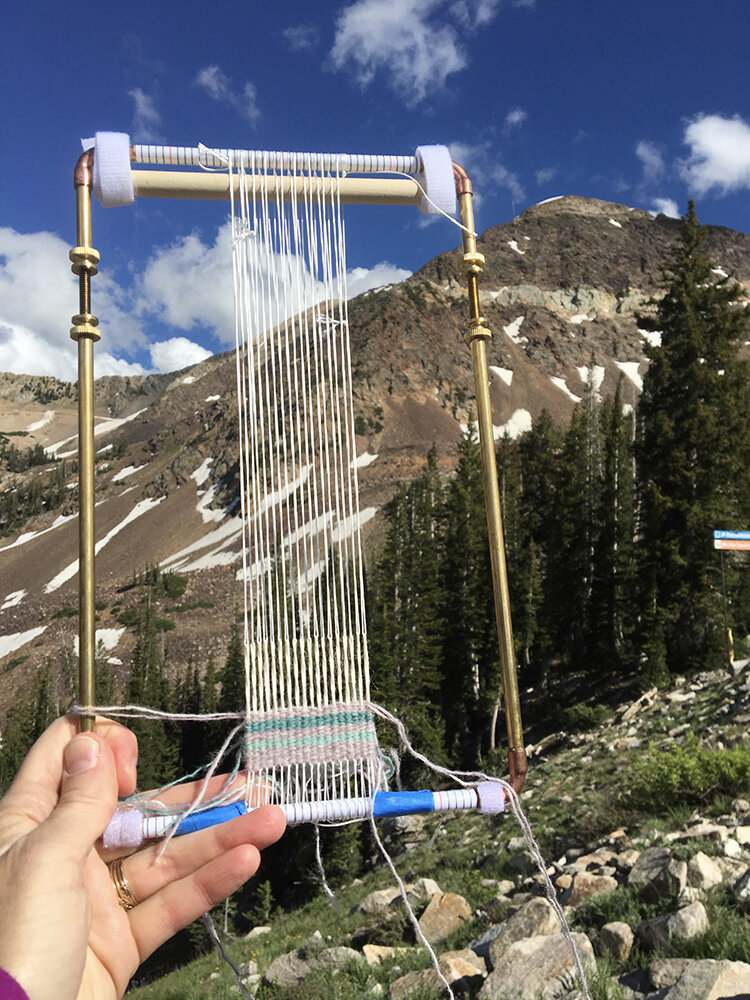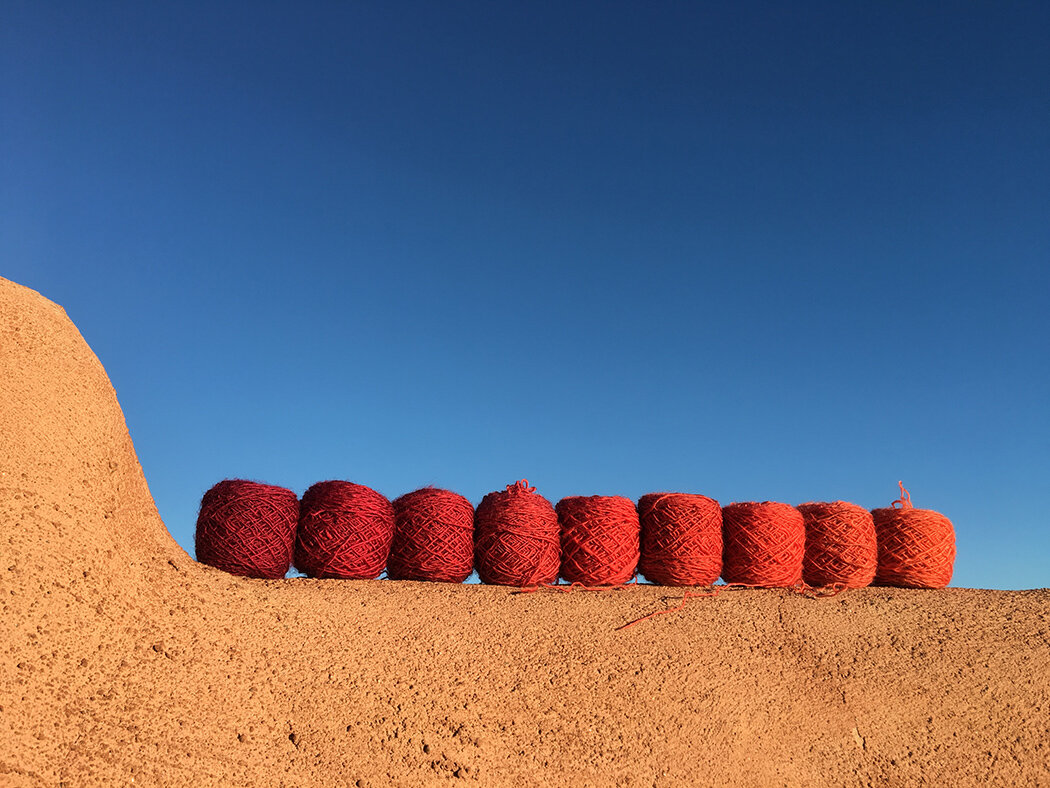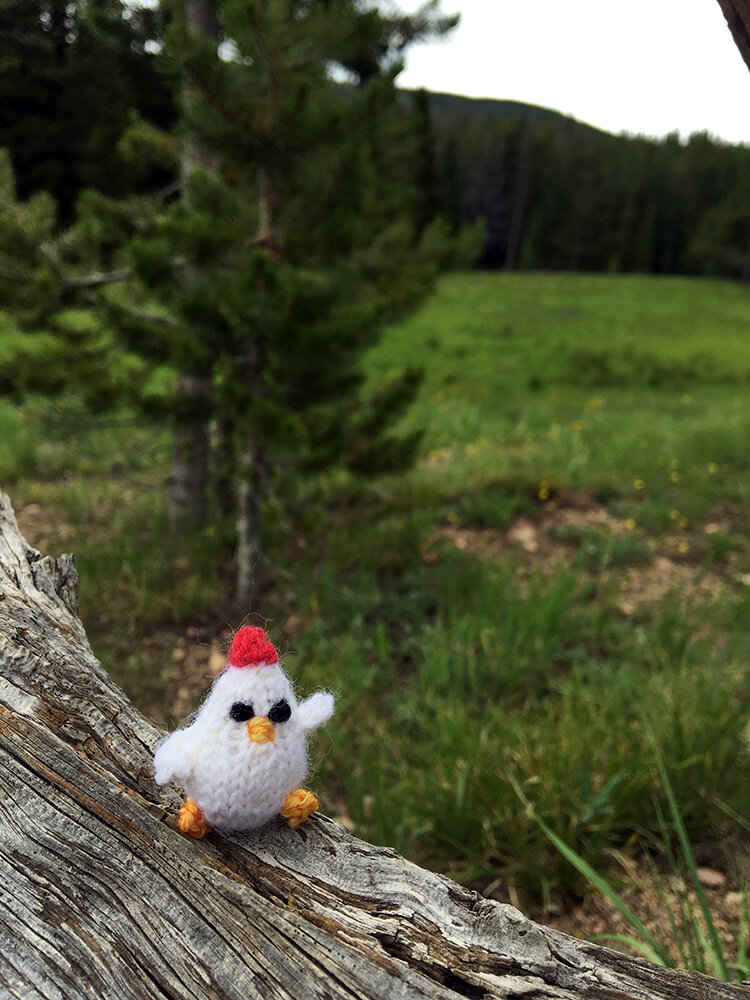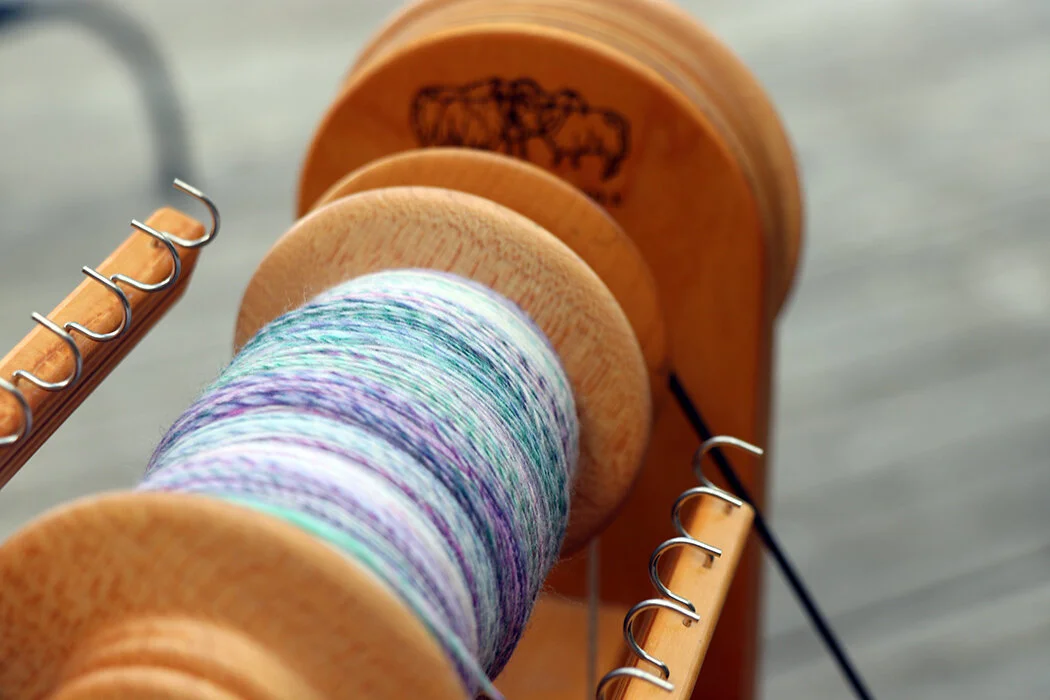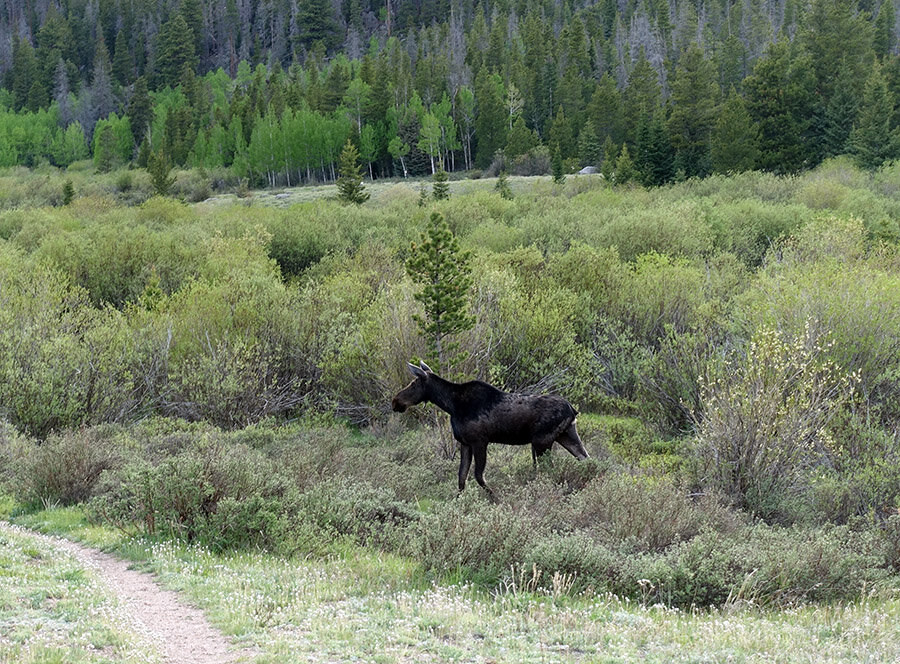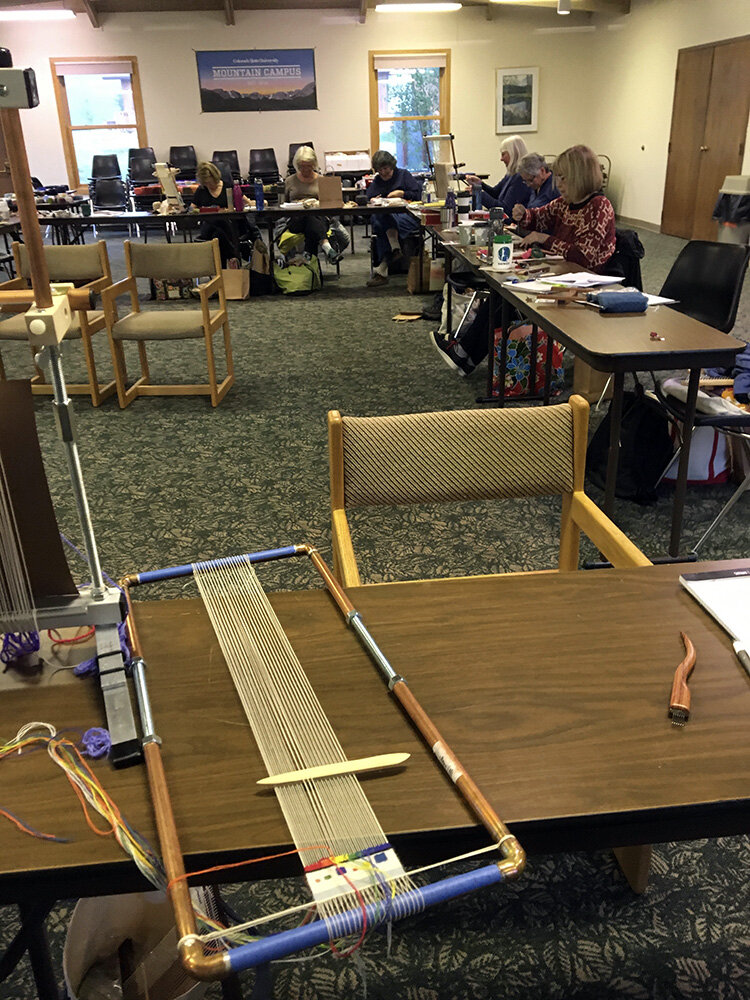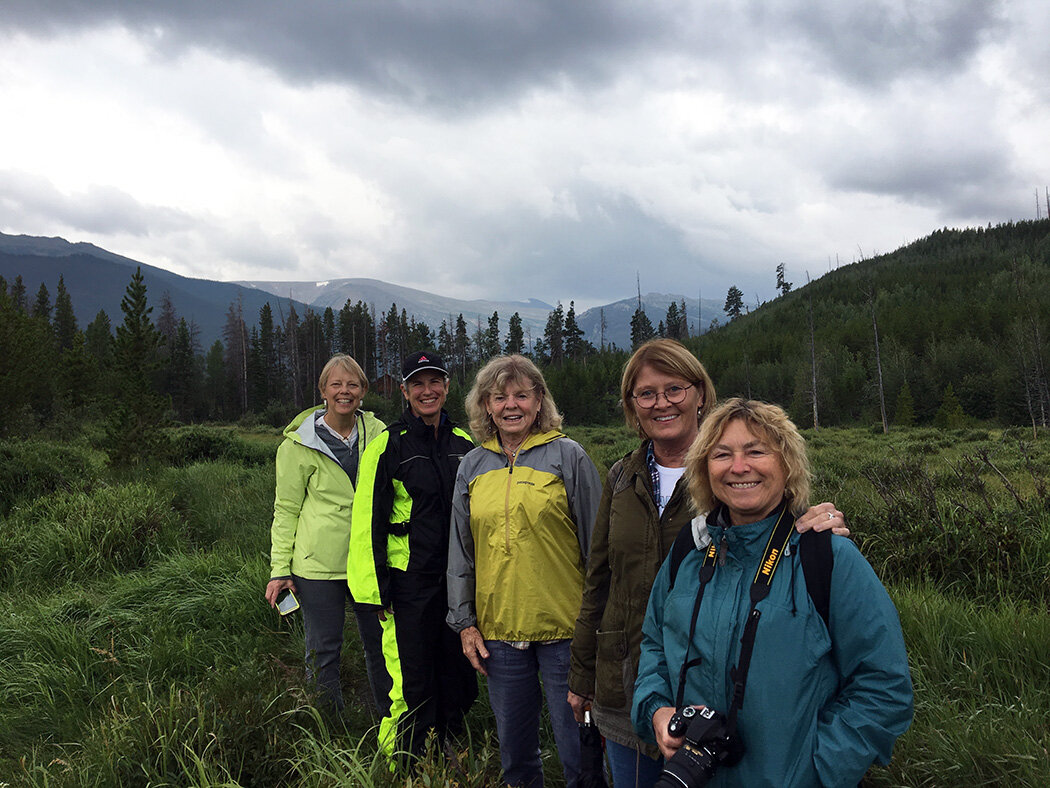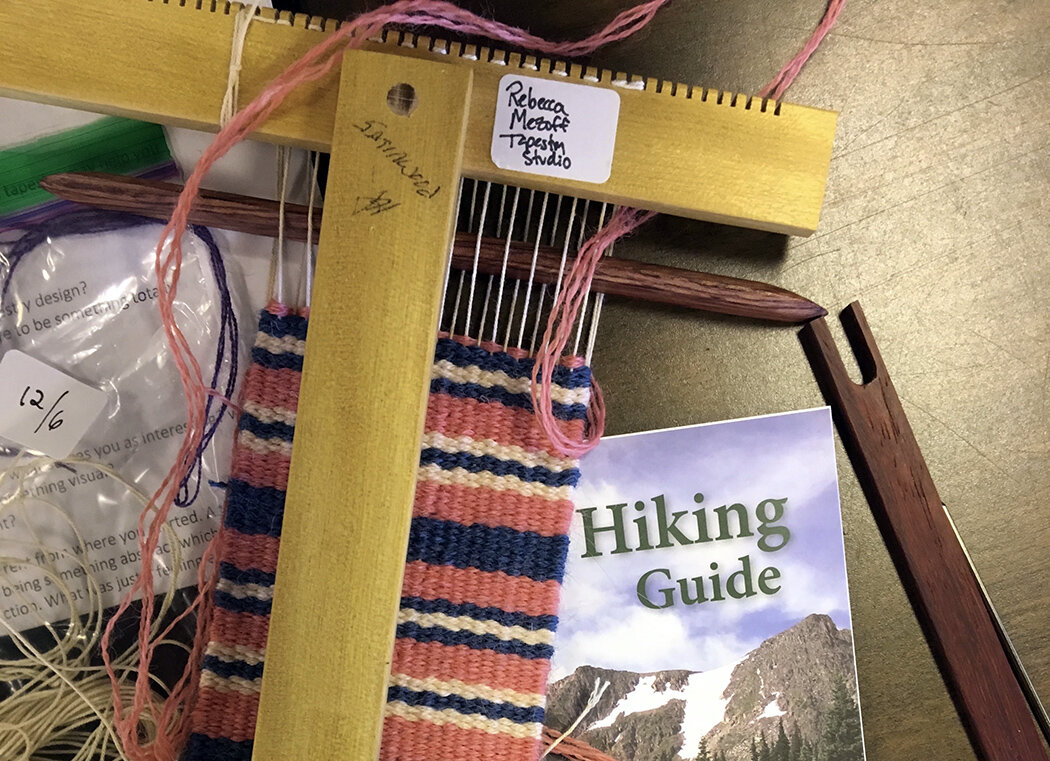Making yarn for tapestry
A retreat experience with Jillian Moreno and Rebecca Mezoff
Dates: June 22-26, 2020
Location: Colorado State University Mountain Campus, 50 miles west of Fort Collins, Colorado
This retreat will be rescheduled due to COVID-19. It will most likely happen in the summer of 2021.
The Masterclass
This retreat blends the talents of two outstanding teachers. Jillian Moreno is a talented spinner but she is also an amazing teacher. Rebecca Mezoff loves nothing more than challenging tapestry weavers to find their best selves through weaving. Together, they’re a zany bit of fiber fun.
Students will spend some time with each teacher in separate classes. Jillian will teach us how to make yarns that work well for tapestry weaving. She’ll include strategies for creating interesting color effects for tapestry yarns. Rebecca will teach us how to use handspun yarns in tapestry. We’ll focus on small pieces or sampling for larger projects.
““Learning to spin is the very best way to understand how yarn really works…””
In this workshop we’ll explore
spinning various kinds of yarn
how to make a yarn that works well as a tapestry yarn
how to use the ability to spin to make different colors and effects in tapestry weaving
tapestry weaving techniques that show off your handspun
using handspun yarns effectively in tapestry weaving
About your teachers
Jillian Moreno, author of the best-selling spinning book Yarnitecture: A Knitter’s Guide to Spinning: Building Exactly the Yarn You Want, can’t stop writing and teaching about spinning and using handspun to knit, weave and stitch. She explores, questions and plays with fiber and wants to take as many people as possible along for the ride. She enthusiastically encourages her students and readers to feel confidence and joy making and using their handspun, even if it means singing and dancing in class. If you can’t find her teaching in person you can find her on Craftsy and in Knitty.com, PLY Magazine and Spin Off Magazine.
When she’s at home in Ann Arbor, Michigan, she can be found wantonly basking in her stash and working on her next book.
Rebecca Mezoff, author of the upcoming book The Art of Tapestry Weaving: A Complete Guide to Mastering the Techniques for Making Images with Yarn (October 2020, Storey Publishing), loves nothing better than teaching people how to play with yarn. A tapestry weaver by trade, her true love is teaching. She has been leading retreats at CSU Mountain Campus and other venues for five years and greatly enjoys the camaraderie and deep learning that can occur in these settings. You can read more about her on this website HERE.
Experience level required
Spinning: You must be able to spin a continuous thread. This is not a retreat for first-time spinners. Use of a spinning wheel is very strongly recommended. Learning to make a particular yarn is much easier on a wheel. Spindles are welcomed and loved but bring a wheel too if possible. An electric spinner is fine. (Rebecca is looking into potential places to rent wheels in Colorado, but with the potential closing of Shuttles, Spindles, and Skeins, this is still up in the air. I should have more information before March 16th.)
Tapestry weaving: You should be able to warp a simple loom and understand how to make basic shapes in tapestry weaving. You don’t have to be highly experienced, but make sure you have some understanding how how tapestry works before coming to the retreat. If you’re new to tapestry weaving, you still have time to learn the basics HERE or HERE.
THE SETTING
This retreat will be held at CSU's Mountain Campus at the end of Pingree Park road. This is a gorgeous setting surrounded by the Mummy Range near the north side of Rocky Mountain National Park. I guarantee you're going to enjoy being in this beautiful place. See the photos in the gallery below for details.
CSU Mountain Campus is at 9,000 feet elevation. The best thing you can do to prepare for this altitude, especially if you live at sea level, is to drink lots of water the two weeks before the retreat and if possible, to spend a day or two in Colorado before going up to campus. Denver and Fort Collins are both at about 5,000 feet and an overnight in one of those cities before coming to campus can make a big difference.
Food: The campus food service is a cafeteria. The food is acceptable but not gourmet. They can accommodate most food issues.
RETREAT SCHEDULE
Monday, June 22, 2020
3-6 pm Arrive, check in at Hodgekiss Lodge, find your cabin
5:30 Meet at Hotchkiss for campus orientation and walk to dining hall together.
6:00 Dinner*
7 pm Meet in the Hodgekiss Lodge lounge to introduce ourselves and talk about our plans for the retreat
Tuesday, June 23
You’ll have a class with Jillian about spinning for tapestry yarns and another class with Rebecca on weaving handspun for tapestry.
Evening relaxation: Firepit next to the river. This gorgeous setting is a great place for an evening snack (marshmallows anyone?) and a beverage.
Wednesday, June 24
You’ll either have a spinning class with Jillian about color use in tapestry yarn creation or a weaving class with Rebecca about optical mixing with focus on using handspun.
Afternoon: Open studio to spend more time with either teacher or you can enjoy the beautiful setting with a hike or time working on your spinning or weaving outdoors.
Evening relaxation: Spin In / Weave In. Bring your work to Hotchkiss Lodge and we’ll have an evening of spinning and weaving. Evening wine and cheese tasting to go along with this one!
Thursday, June 25
You’ll take the class you didn’t have on Wednesday this day.
Afternoon: Open studio to spend more time with either teacher or you can enjoy the beautiful setting with a hike or time working on your spinning or weaving outdoors.
Evening relaxation: Movie Night. Gather in the Hotchkiss Lounge to watch A Weaverly Path: The Tapestry Life of Silvia Heyden. I guarantee this movie will inspire you in any kind of artistic path.
Friday, June 26th
Breakfast
9-11 am Workshop review and wrap-up. Discussion of what we learned with show and tell. This is important. Please plan on attending.
10 am Group photo
Pack and disperse as needed.
12 pm Lunch
Check out by 1 pm
Ongoing evening events at your leisure:
Loom sampling. Ever want to try different tapestry looms? Rebecca will bring some warped looms for you to try out including a few Mirrix looms, a variety of small lap looms, a Glimakra Freja, a couple pipe looms you can make yourself, and hopefully the new Schacht Arras Tapestry loom.
Tapestry yarn tasting. Interested in commercially available tapestry yarns? Rebecca will have small amounts of a few you can try out and compare to your hand spun. The yarn list is still in preparation, but expect a variety such as Frid Vevgarn, Bockens Faro, Harrisville Designs yarns, Appleton crewel, weaversbazaar, Colonial Persian, and EPiC.
*note that meal times are subject to change depending on how the campus staff arranges groups. They can accommodate gluten free, dairy free, and vegan diets and are good about telling you exactly what is in any dish.
Pricing
Retreat fee: $775
Housing and food are billed separately at the rates below (price is for the entire 5-day retreat):
Private room: $675
Shared room, fee for each person: $585
Due to coronavirus concerns, payments have been extended. Due dates are:
Deposit due April 24
Full amount due by May 4
Please see the note at the top of of this page for further details.
Spouse attendance: I have a few spots for spouses. If yours wants to come, you will both pay the shared room fee and they may attend all meals. Hiking, fishing (with valid CO fishing license), and bird-watching are just a few things that could keep your significant other busy during the retreat and they may join us for meals.
CANCELLATION TERMS
Please see the note at the top of this page for updated cancellation terms.
WHAT TO BRING
For the mountain campus:
Bring clothing appropriate for June at high altitude in Colorado. There will likely still be at least patches of snow above campus if you're hiking high, but the campus will be clear of snow. Though the front range around Denver, Boulder, and Fort Collins can be quite warm this time of year, CSU's Mountain Campus is significantly higher in elevation and you should be prepared for some chilly mornings and evenings. It should be pleasantly warm during the day. Rain is not very likely in Colorado in June, but you might want to pack a rain jacket just in case (you should definitely bring one if you're going hiking). You will want sturdy shoes for walking on uneven ground as well as any hikes you want to take. Mud, rocks, and water all happen here.
If you want to do some hiking, make sure your gear is appropriate. Don't forget your trekking poles if you use them for balance as I do.
a water bottle. High-altitude living demands a lot of water drinking.
You may find a small backpack or bag useful if you’re going to do some weaving outside the classroom or take walks with your loom. This is also helpful for going to the dining room with your water bottle and perhaps an umbrella or rain jacket.
The stars will be stunning. Don't forget to go outside at night to look at them. But you'll want a flashlight for getting around.
Each room has a private bathroom with a shower. All beds are twin sized.
We will be eating in the campus cafeteria.
There will be other groups on campus while we are there. We will be sharing that dining hall though our classroom and cabins will be just for us. A map of the campus can be seen HERE. In June, other groups on campus are usually college-aged students doing research projects. They can be fascinating to talk to, so ask what they're up to.
There will be coffee and tea provided in the workshop room and there is refrigeration if you want to bring any snacks. I will be bringing enough wine for the first evening to share. If you’d like to contribute any beverages or snacks, please bring them!
For the workshop: Details coming soon but you will need to bring a spinning wheel and a small tapestry loom (Rebecca will have a few loaner looms available if you need one. Please ask her about this in your registration form).
HOUSING
Housing is in multi-room cabins. Each room has a private bath and has two or three twin beds (with a top bunk that will remain unused except for storage!). There are no larger beds available. Each cabin has a lounge with a small refrigerator. You can reserve a room privately or share with a friend or significant other. If your significant other would like to come with you to the campus but does not want to participate in the retreat, please check the box indicating this on the registration form.
If you’d like to share a room with someone you don’t know prior to the retreat, I can probably arrange this but can’t guarantee that there will be a room-share partner available.
GETTING THERE
I will send everyone a map with driving directions from Fort Collins to the campus after registration. It takes two hours to get from Fort Collins to the Mountain Campus.
The campus is at the end of Pingree Park road. This is a very wide, well-maintained 16-mile gravel road that branches off Highway 14 in the Poudre Canyon. The campus is 50 miles west of Fort Collins, CO. This is mountain driving, but this road is exceptionally good and quite wide. Any passenger car and a driver who is okay with moderate mountain driving will be just fine.
The nearest airport is Denver International Airport in Denver, CO which is approximately one hour south of Fort Collins. I recommend the E-470 toll road. It is worth the $6 (license plate toll, no stopping). Please leave at least three hours to drive from DIA to the mountain campus. For your return flight, you should know that DIA sometimes has really long security lines and you need to be at the airport two hours before your flight leaves. TSA pre-check can make a huge difference at this airport and you won’t need as much time for security if you have it.
RIDESHARE
I will not be providing transportation to the campus, but it is possible to arrange a shared rental car or carpool with other participants and Rebecca can facilitate that communication.
There is a shuttle from Denver International Airport to Fort Collins on Groome Transportation: https://groometransportation.com/fort-collins/
Frequently I can find people who can take people from Fort Collins to the campus so if you fly into DIA and want to take the shuttle to Fort Collins the day before (they’ll drop you off at any hotel), should be able to find you a rideshare from there to the mountain campus.
There is NO public transportation from Fort Collins to the Mountain Campus. You'll need to rent a car or find a carpool.
TECHNOLOGY, MEDICAL SERVICES, AND ADA ACCESS LIMITATIONS
There is no cell service at CSU Mountain Campus or anywhere nearby. Believe me. None.
There are several public phones that are available for your use and there is limited wifi access in the campus buildings. It should be enough to communicate with your loved ones that you are safe and enjoying yourselves mightily. The wifi is quite limited, so don't expect to be able to post to social media. You can send basic emails and that is about it! CSU instituted data limits for users in 2018 so you’ll be cut off after using a certain amount of data. This retreat is a great opportunity to unplug for a few days.
Though at times the wifi appears to work very well, there is actually very little bandwidth. If you make that video call home, it means that no one else on campus can check their email or send a message. Please do not make video calls. There is a land-line that your loved one can call during office hours (7 am - 7 pm) and the call can be routed to your cabin or the lodge or you can bring a calling card to make long distance calls. Calls to 970 area codes are free.
CSU Mountain campus does not have paved trails or roads. You will not be able to drive between your cabin and the dining hall which is about 1/8 of a mile walk. The ground is fairly level once you are on campus. Once you arrive your car will likely remain parked until you leave.
There is a nurse on campus at all times, but ambulances do not go to this place. If you have a medical emergency and the nurse and camp director determine you must leave, you will most likely get a ride in a helicopter. If you have a heart condition, please consult with your physician before coming to this altitude and make sure to take all your medication with you! Most people who are reasonably healthy have no significant difficulties with this altitude beyond an occasional headache. Just keep drinking water! The campus is at 9,000 feet.
GALLERIES
The images below are from past retreats at CSU Mountain Campus so you can get a feeling for the environment.
Click on the photos for the full view. Hover for caption in enlarged view. Use arrows right and left to scroll.





